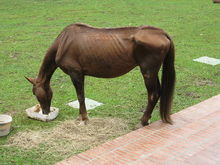The U.S. Department of Agriculture’s Animal and Plant Health Inspection Service (APHIS) is continuing to move swiftly and consistently to take enforcement action in response to animal welfare violations. As part of its effort to make its actions transparent and accessible to the public, APHIS is highlighting enforcement actions taken in response to violations of the Animal Welfare Act (AWA) and Horse Protection Act (HPA).

A starved and beaten horse
As part of its effort to make its actions transparent and accessible to the public, APHIS is highlighting enforcement actions taken in response to violations of the Horse Protection Act.
© 2013 by George Donnelly
Copies of documents related to these actions, as well as copies of official warnings, are available in the APHIS FOIA Reading Room
During the month of November, APHIS filed administrative complaints alleging that the following persons violated the HPA:
HPA Docket No. 14-0017, 14-0018, and 14-0019; Allan S. Callaway, d/b/a Allan Callaway Stables, Sidney Gatrell Blackmon, Jr., and Mary Elizabeth Davis.
USDA's administrative law judges and judicial officer issued decisions and orders under the HPA involving the following persons:
- HPA Docket No. 13-0346; Brandi L. Mills.
- HPA Docket No. 13-0242; Nicholas Plafcan
- HPA Docket No. 13-0022; Michael Chiappari
All of the cases involving violations of the Horse Protection Act during November were brought as a result of the soring of horses by the people involved.
The AWA requires that minimum standards of care and treatment be provided for certain animals bred for commercial sale, used in research, transported commercially or exhibited to the public. It excludes those animals raised for food or fiber. Persons who operate facilities in these categories must provide their animals with adequate care and treatment in the areas of housing, handling, sanitation, nutrition, water, veterinary care and protection from extreme weather and temperatures.
To ensure that its licensees are meeting the AWA standards, APHIS inspectors conduct routine, unannounced inspections of all licensed facilities. Violations of the AWA can lead to penalties, including official warnings, civil penalties and license suspensions/revocations. For more information on the inspection and enforcement processes, visit APHIS.
The HPA is the federal law that prohibits horses subjected to a practice called soring from participating in shows, sales, exhibitions and auctions. Soring is a cruel and abusive practice used to accentuate a horse’s gait. APHIS works actively with the horse industry to protect against such abuse, ensuring that only sound and healthy horses participate in shows, sales, exhibitions and auctions. APHIS’ ultimate goal is to end the inhumane practice of soring completely.
The HPA authorizes APHIS to issue civil penalties and to disqualify violators from participating in horse shows, exhibitions and sales. Both the AWA and HPA contain criminal penalties as well.
